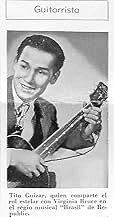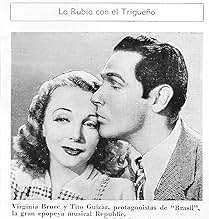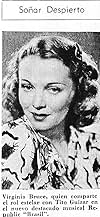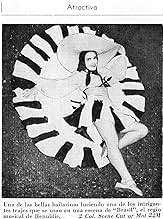Ajouter une intrigue dans votre langueA songwriter struggles to produce another successful hit for the National Brazilian song contest.A songwriter struggles to produce another successful hit for the National Brazilian song contest.A songwriter struggles to produce another successful hit for the National Brazilian song contest.
- Nommé pour 3 oscars
- 3 nominations au total
Alfredo DeSa
- Master of Ceremonies
- (as Alfred de Sa)
Henry Da Silva
- Comerciante
- (as Henry De Silva)
Edward Coch
- Airport Official
- (as Rico De Montez)
Leonardo Scavino
- Reporter
- (as Leon Lenoir)
Billy Daniel
- Dancer
- (as Billy Daniels)
María Belmar
- Woman at Window
- (uncredited)
Edward Biby
- Nightclub Patron
- (uncredited)
Histoire
Le saviez-vous
- AnecdotesThe book that the heroine writes was inspired by the notorious magazine article "Latins Are Lousy Lovers" by Helen Lawrenson, which appeared in Esquire in 1936. It created a tremendous sensation, with many individuals and even governments denouncing Lawrenson, who confessed later that it hadn't done a lot for her own love life. She would be introduced to handsome Latin men who were at first friendly, and then, hearing the name of her most famous article, would drop her like a stone, unlike the character in the movie who saw it as a challenge.
- ConnexionsReferenced in Brazil (1985)
Commentaire en vedette
I wonder if the award-winning song really was called "Rio de Janeiro." According to my resource book on the Academy Awards, the song "Brazil" from this movie was the Academy Award winner for "Best Song" category in 1944.
I checked with sheetmusicplus.com and could not find a song called "Rio de Janeiro." If there is such a song in print, I would like to know about it as I love Latin music.
I agree this film should have been in color. Maybe Ted Turner can colorize it for us. Also, I should like to see it available on DVD soon.
As for Edward Everett Horton being in the film, I believe he appeared in other films set in South America in this era. No doubt the interest in Latin America expressed through movies in the 1940s and television in the 1950s was because of South American oil the United States and Canada bought for military use during World War II and during the industrial expansion and prosperity that followed the war. If you think about it, you can see the political undertones in the films of this era.
I checked with sheetmusicplus.com and could not find a song called "Rio de Janeiro." If there is such a song in print, I would like to know about it as I love Latin music.
I agree this film should have been in color. Maybe Ted Turner can colorize it for us. Also, I should like to see it available on DVD soon.
As for Edward Everett Horton being in the film, I believe he appeared in other films set in South America in this era. No doubt the interest in Latin America expressed through movies in the 1940s and television in the 1950s was because of South American oil the United States and Canada bought for military use during World War II and during the industrial expansion and prosperity that followed the war. If you think about it, you can see the political undertones in the films of this era.
- Sheila_Beers
- 4 juill. 2008
- Lien permanent
Meilleurs choix
Connectez-vous pour évaluer et surveiller les recommandations personnalisées
Détails
- Date de sortie
- Pays d’origine
- Langues
- Aussi connu sous le nom de
- Stars and Guitars
- Lieux de tournage
- société de production
- Consultez plus de crédits d'entreprise sur IMDbPro
- Durée1 heure 31 minutes
- Couleur
- Rapport de forme
- 1.37 : 1
Contribuer à cette page
Suggérer une modification ou ajouter du contenu manquant


































